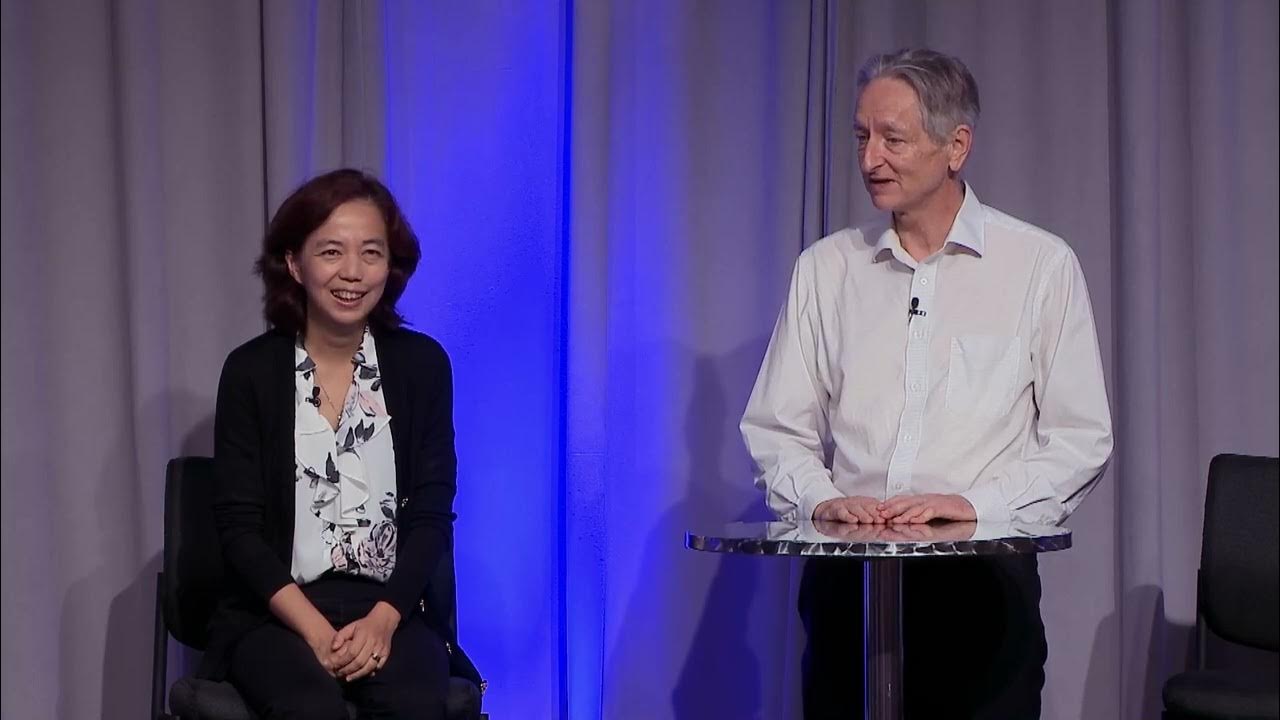AI, science & society | Fact & Fiction: The Future of Democracy | Nobel Prize Dialogue Brussels 2024
TLDRThe panel discussion delves into the intersection of AI, science, and society, featuring European Commission VP Vera Jourova, Google DeepMind's Demis Hassabis, and Nobel laureates Paul Nurse and Ben Feringa. They explore AI's transformative impact on scientific research, from protein folding to drug discovery, and its potential to enhance critical thinking in education. The conversation also addresses AI's role in upholding democratic values, the importance of data integrity, and fostering a collaborative approach between technologists, politicians, and researchers to harness AI's benefits responsibly.
Takeaways
- 🧠 AI as a Tool for Accelerating Scientific Discovery: Demis Hassabis from DeepMind discussed AI's potential as an ultimate tool for scientific discovery, particularly highlighting AlphaFold's impact on protein structure prediction and its implications for drug discovery and disease understanding.
- 🧬 AI's Role in Biology: Paul Nurse emphasized the transformative effect of AI, especially AlphaFold, on biological research, allowing scientists to predict protein structures from DNA sequences and facilitating a faster pace of discovery.
- 🛠️ AI in Chemistry and Material Design: Ben Feringa shared insights on AI's application in chemistry, from designing complex molecules for pharmaceuticals to creating effective consumer products like shampoos, by analyzing vast amounts of data to inform better experimental design.
- 🤖 Critical Thinking and AI: The panelists agreed on the importance of critical thinking when using AI tools. They highlighted the need for scientists and students to question the data and analysis provided by AI to ensure reliability and accuracy.
- 🏛️ AI and Democracy: Vera Jourova, Vice President of the European Commission, discussed the challenges and responsibilities that come with AI in terms of transparency, values, and the potential for misinformation, stressing the need for legislation to keep pace with technological advancements.
- 📚 Education and AI: The panel touched on the importance of educating young people to be critical consumers of information, especially with the influx of AI-generated content, to distinguish valuable insights from misinformation.
- 🔮 Predicting AI's Future Impact: There was a consensus on the potential of AI to revolutionize various scientific disciplines, with Hassabis suggesting upcoming 'golden era' of scientific discovery aided by AI.
- 🛡️ AI for Democratic Defense: Hassabis also mentioned the defensive use of AI, such as watermarking to detect deepfakes, as a means to protect democracies against misinformation and manipulation.
- 🌐 AI's Influence on Society: The panel explored AI's broader implications for society, including its potential to help address global challenges like healthcare efficiency and climate change.
- 🔍 The Importance of Data Quality: A recurring theme was the necessity of high-quality data for AI systems to function effectively, affecting the reliability of predictions and insights generated by AI.
- 🤝 Collaboration Between Stakeholders: The script concluded with a call for collaboration among technologists, politicians, and researchers to harness AI's potential for the benefit of society, emphasizing the need for joint efforts to understand and shape AI's development.
Q & A
What is the main topic of the session described in the transcript?
-The session focuses on the relationship between AI science and society, discussing the impact of AI on various scientific fields and its implications for democracy and society.
Who are the panelists introduced in the session?
-The panelists are Vera Jourova, the European Commission Vice President for values and transparency; Demis Hassabis, the co-founder and CEO of DeepMind; Paul Nurse, a 2001 Nobel Laureate in Medicine; and Ben Feringa, a 2016 Nobel Laureate in Chemistry. The session is moderated by Maria Leptin.
Outlines
🤖 AI's Role in Scientific Discovery and Democracy
The panel discussion introduces the theme of AI's impact on science and society, featuring notable figures such as the European Commission's Vice President for Values and Transparency, Vera Jourova, alongside AI leaders and Nobel laureates. The session aims to explore how AI influences scientific research and democratic values, with a focus on the potential of AI to accelerate scientific discovery and its implications for transparency and societal values.
🧬 AI's Transformative Impact on Biology and Drug Discovery
Demis Hassabis, CEO of DeepMind, discusses AI's significant role in scientific research, particularly in biology, with the example of AlphaFold, a program that has revolutionized protein structure prediction. The technology's ability to predict 3D structures from genetic sequences has vast implications for drug discovery and understanding diseases. The discussion also touches on the broader potential of AI to transform various scientific disciplines.
🔬 AI Applications in Chemistry and the Importance of Predictive Capabilities
The panel delves into the practical applications of AI in chemistry, with the example of designing pharmaceuticals and materials. AI assists in navigating complex chemical pathways and predicting optimal routes for drug synthesis. Additionally, AI's predictive capabilities are highlighted as a crucial first step towards understanding, with the acknowledgment that further exploration is needed to deepen comprehension.
🏛️ AI and the Preservation of Democratic Values
Vice President Jourova addresses AI's role in upholding democratic values and transparency. She discusses the challenges of ensuring that AI aligns with human rights and dignity, reflecting on her work with digital platforms to prevent the creation of echo chambers and ensure ethical standards in AI. The narrative also touches on the legislative efforts of the European Commission to regulate AI, especially in light of rapid advancements.
📚 The
Mindmap
Keywords
💡AI Science
💡Society
💡European Commission
💡DeepMind
💡AlphaFold
💡Nobel Laureates
💡Critical Thinking
💡Misinformation
💡Transparency
💡Democracy
💡Fundamental Research
Highlights
AI as a tool for accelerating scientific discovery, with a new era potentially beginning in the next decade.
DeepMind's AlphaFold program has solved the problem of protein folding, with implications for drug discovery and disease understanding.
Over 200 million protein structures have been predicted by AI, a task that would have taken millions of years of experimental work.
AI's potential to revolutionize various scientific disciplines, including chemistry, material science, physics, and mathematics.
AI's role in predicting three-dimensional structures of proteins from DNA sequences, aiding amateur scientists.
The limitations of AI in understanding phenomena versus its ability to predict outcomes, emphasizing the need for further exploration.
AI's application in chemistry for designing molecules and materials, streamlining the process of creating new drugs.
The use of AI in creating consumer products, such as shampoo, by analyzing complex chemical and physical parameters.
Vice President Jourová's focus on values and transparency in AI, ensuring human rights and equality are upheld in the digital space.
The importance of critical thinking in the era of AI, training students to question and analyze AI-generated information.
AI's potential to assist in interdisciplinary science by making connections and summarizing areas of research.
The necessity of high-quality data for AI systems to provide reliable and factual outcomes.
AI's defensive applications, such as watermarking generated images to detect and flag deepfakes.
The opportunity for AI to strengthen democracies by accelerating innovation and addressing societal challenges.
The need for a collaborative approach between technologists, politicians, and researchers to harness AI's potential responsibly.
The importance of fundamental blue-sky research as the foundation for the modern machine learning boom and future AI advancements.
The potential of AI to be a strength for democracies, provided it is used responsibly and innovatively.
Transcripts
Browse More Related Video

Artificial Intelligence | 60 Minutes Full Episodes

Keynote by NVIDIA CEO Jensen Huang at 2024 SIEPR Economic Summit

Geoffrey Hinton in conversation with Fei-Fei Li — Responsible AI development

The Future of Artificial Intelligence

In the Age of AI (full documentary) | FRONTLINE

How AI Could Save (Not Destroy) Education | Sal Khan | TED
5.0 / 5 (0 votes)
Thanks for rating: